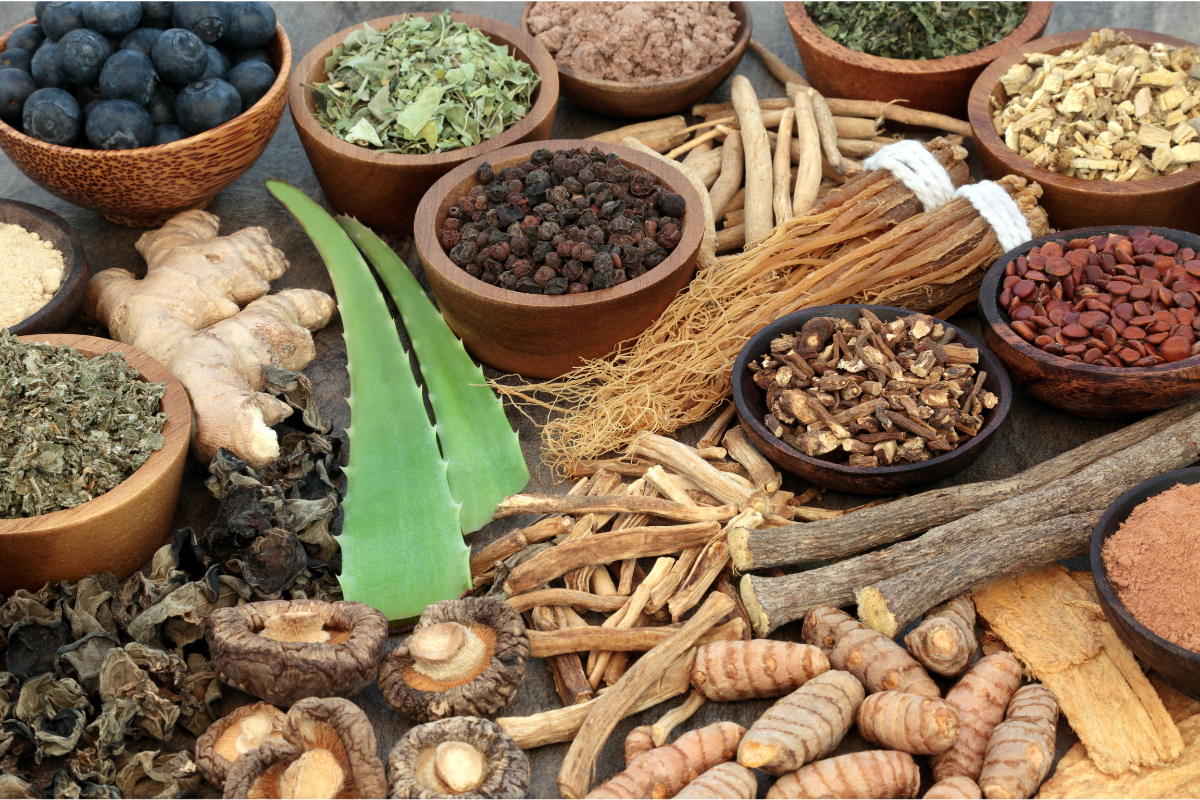What are the benefits of adaptogens?
More and more people are becoming aware of the term “adaptogen” thanks to increased marketing of wellness products like natural herbal supplements and remedies. The word itself dates back to the work of Soviet toxicologist Nikolai Lazarev in the 1940s. In practice, however, the herbs known to today’s consumers as adaptogens have been widely used and revered for thousands of years in Traditional Chinese Medicine (TCM) and Ayurvedic traditions.
So what are adaptogens? Do adaptogens work? Are adaptogens safe? These are all important questions, so let’s start with the easy one.
Adaptogens are plant-based substances that have traditionally been used in Asia and India to treat a wide range of complaints and ailments, both physical and psychological. They comprise a variety of herbs, roots and mushrooms that are believed to help restore and maintain balance in the body’s systems, which helps to relieve stress and its symptoms.
When it comes to the effectiveness and safety of adaptogens, that’s where it gets a little more complicated. Opinions are abundant, and many studies indicate promising effects on stabilizing the human body against stress and fatigue. However, as with most natural supplements, evidence from clinical research has not risen to the level of approval by the US Food and Drug Administration (FDA).
This article is intended as an overview of adaptogens and their potential benefits according to those who have used and studied them.
Potential Benefits of Adaptogens
Usually consumed in capsules, teas or as a powder mixed into smoothies or other foods, various adaptogens have been evaluated by scientists and people around the world to see if they can deliver a range of beneficial properties, including the following.
- Stress Reduction: Stress has been defined as the “nonspecific response of the body to any demand for change.” The better equipped our bodies are to adapt to change, the better prepared we are to mitigate the effects of stressors, whether physical, environmental or emotional. Studies have suggested that adaptogens may help reduce the level of the body’s main stress hormone, cortisol, and alleviate stress-related symptoms, from anxiety, depression and insomnia to inflammation, headaches and digestive issues.
- Improved Cognitive Function: Some adaptogens, such as Ginseng and Rhodiola, have been associated with improved cognitive function, including enhanced memory, focus, and mental clarity. Clinical trials have suggested that adaptogens may support one’s ability to concentrate in situations of stress and mental fatigue.
- Enhanced Energy and Stamina: Adaptogens are believed to support physical endurance and vitality, making them popular among athletes and others seeking an energy boost in their everyday lives.
- Immune System Support: Certain adaptogens, like Astragalus and Reishi mushrooms, have shown immune-modulating properties that may strengthen the body's defense against infection and disease.
- Mood Regulation: Holy Basil and Ashwagandha have been studied for their potential in reducing symptoms of depression and anxiety, though more research is needed to establish their efficacy.
A brief look at some common adaptogens
There are a few criteria required for an herb, root or other plant-based substance to be considered an adaptogen. Most importantly, it must be nontoxic at normal doses, but it also needs to possess properties that support the body’s ability to cope with stress and return to a stable state, or homeostasis.
Although each adaptogen is known for particular properties, it has been observed that some combinations of adaptogenic plants may offer synergistic effects and benefits that are not found in one ingredient acting on its own.
Ginseng
American ginseng and Asian ginseng are among the most well-known and widely used of the traditional herbal supplements for their potential to combat fatigue, boost brain function and lower blood sugar, although consistent scientific evidence for these claims is sparse.
Eleutherococcus senticosus
Also known as Siberian ginseng, this adaptogen is not a true ginseng, although it is native to Russia. Cultures throughout Asia have used this woody shrub to increase energy, vitality, and strength, and as an immune booster to treat the flu, cold, and respiratory problems. It is believed that eleutherococcus can support quicker recovery from physical and mental stress.
Ashwagandha
The traditional name of Indian ginseng, Ashwagandha is a popular adaptogen for stress and a staple of Ayurvedic medicine practiced throughout India and Nepal for millennia. This herb can possibly help reduce anxiety, depression and insomnia, but there is insufficient evidence to back this up for sure. There may be moderate interactions with ashwagandha and certain prescription drugs, so always seek your doctor’s advice.
Maca Root
Found high up in the Peruvian Andes mountains, this nutty, slightly sweet vegetable has been used by local communities for thousands of years to boost energy, fertility, bone strength, memory support and more. While much more scientific study is needed, “maca-maca” is known to have high concentrations of iron, iodine, potassium, calcium amino acids, vitamins and minerals.
Holy Basil
This aptly named plant, sacred among certain Hindu sects, is also called tulsi and used to increase focus, decrease anxiety and boost the immune system.
Schisandra
This herb is thought to promote liver health and stabilize blood sugars, in addition to having an adaptogenic effect on concentration and endurance.
Rhodiola rosea (R. rosea)
Sometimes called arctic root or rose root, this herb is often used to treat minor health ailments like headaches and flu. It grows in mountainous regions throughout Europe, Asia, and North America. Research has pointed to the possibility that some of its compounds may contribute to enhanced immunity, reduced inflammation, DNA repair and even cancer prevention.
Cordyceps
A type of fungus, cordyceps is commonly used to treat stress, inflammation and problems with the liver, kidneys and respiratory system.
Reishi
This mushroom adaptogen is used to boost the immune system and has been studied for its potential in treating cancerous tumors.
The Science of Adaptogens
There have been many studies researching the possible physical and mental effects of adaptogens, especially involving ashwagandha, rhodiola, ginseng and cordyceps. However, there is little, if any, conclusive evidence that they provide some or all of the benefits commonly associated with them.
Research does indicate that adaptogens interact with the hypothalamic-pituitary-adrenal (HPA) axis of the brain, which is involved in the release of stress hormones. If this is the case, it would make sense that adaptogens may have value in mitigating the effects of chronic stress on the human body.
Are Adaptogens Safe for Everyone?
A good rule of thumb with adaptogens, is to use them to supplement—and not to supplant—other types of care or treatments that have been clinically proven to be safe and effective. Adaptogens should not be thought of as a permanent, standalone solution or alternative to positive lifestyle changes.
While several adaptogens have been studied and determined to be safe and nontoxic up to a certain dosage, none are FDA approved or regulated, and there may be adverse effects for some people. For instance, women who are pregnant or breastfeeding, children under 12 and people with heart disease or hormone conditions should be especially careful before adding adaptogens to their diet.
Adaptogens are generally considered to be safe and non-addictive, but everyone is different. Some people may experience side effects or interactions with other medications they are taking. It is important to consult a doctor, especially if you have any other conditions or are taking medications. If you do try them, start slow and pay close attention to how they affect you.
With extensive traditional use and rapidly growing scientific study, adaptogens just may prove to be a natural way to combat stress and enhance well-being.
Sources:
https://www.ncbi.nlm.nih.gov/pmc/articles/PMC3991026/






